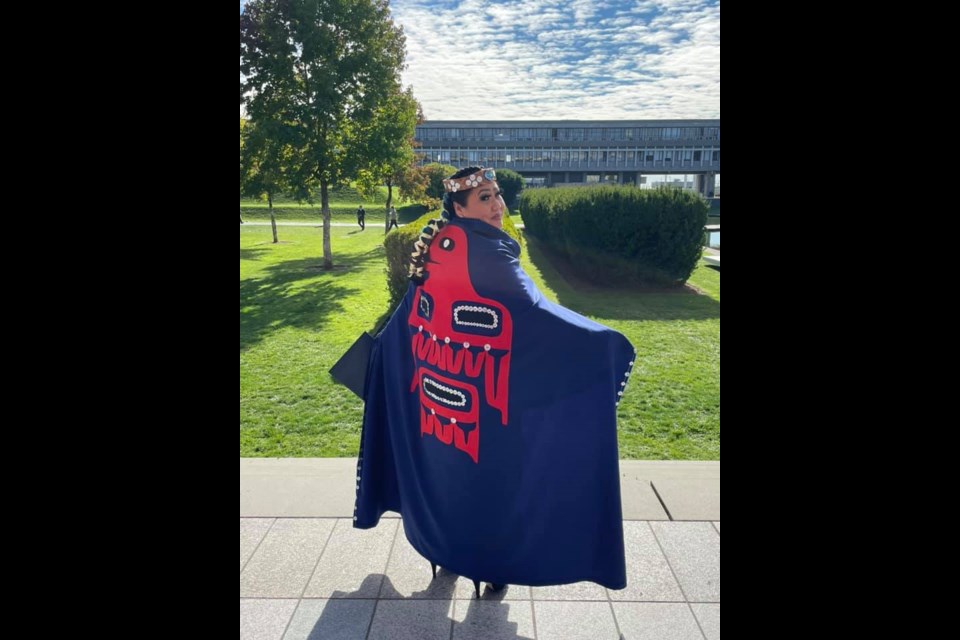She recently graduated from SFU's Masters in Education program, during which she focused on Sḵwx̱wú7mesh praxis — upbringing and the teachings.
She has a long history of being involved in many Indigenous projects, boards, and committees, including currently serving on the for a second term.
Ricketts, 47, is also a manager at , a mother and a grandmother.
She aims to, among other things, help decolonize processes for Indigenous people across Canada.
The СŔ¶ĘÓƵ caught up with the busy Ricketts for a chat about graduating, where she came from and where she hopes we all are headed.
What follows is a version of that conversation that has been edited for length and clarity.
Q: Why did you want to pursue your master's degree in education?
A: A bit of background on who I am and where I come from: my mother, Johanna Paull, married into the Squamish Nation, but was originally from the , which is in the Kootenays. She was an Indian Residential School survivor. She was a fluent speaker in the Ktunaxa language, but she never spoke it. She never taught us. She told me that they ripped her from her grandmother when she was about five and took her to Indian Residential School. She didn't speak English and they did horrible things to her like poke her tongue with needles, so she learned how to speak English
I had to grow up fast because, unfortunately, my mother entered the world of addictions to bury her pain.
I had to help care for my younger sister, who is four years younger than me. I lived most of my life in survival mode essentially.
When my mother found out she had advanced Stage 4 cancer in 2017, I realized that I needed to further my education because I wanted to make her proud.
She passed away in 2018.
Thanks to my mentors, such as Verna Billy-Minnabarriet, vice president at the , where I worked for seven years, and through my part-time work at, I recognized the importance of giving back to Indigenous people in any way I can.
I also realized I did suffer from intergenerational trauma. And growing up, I never felt good enough; I never felt smart enough. When I started advancing my education, I started at . I took that to deepen my knowledge of intergenerational trauma.
I have over 20 years of management experience leading high-performing teams. Still, to really get somewhere where I could sit on a board or in a job where I could change policies and keep the decolonizing door open and pave the way, I realized I needed to go out and get a formal education. I wanted to give back to the community and do that in a good way. I got my degree in May of 2019, and then I applied for my Master's of Education with SFU in May of 2019, and I started in the fall of 2019.
I also took a degree in Aboriginal Governance and Leadership at the same time.
Starting with NVIT and then at SFU, the learning style catered to Indigenous people. I felt confident.
I never thought I could get good grades, and I got really good grades.
Q: What was your capstone or culminating project?
A: I did mine on creating an Indigenous emergency response team.
in Vancouver teams a police officer with a nurse or a registered psychiatric nurse to provide assessments and intervention for people living with mental illness.
My proposal was to also have an Indigenous person on the team to go and follow up on calls. I think it is essential for our Nation because a lot of our people are not comfortable with police officers. While I was working with as a domestic violence support worker, I noticed I was the link to starting to build trust between the people and the police officers.
I know that if we have an Indigenous person on the team, it helps alleviate stress and mistrust.
Q: Now that you have your master's, what do you want to do next?
A: My main focus is to help continue to decolonize policies in education, law enforcement and health. That is my plan.
Q: That is a lot to tackle. What keeps you from being completely overwhelmed by the work that has to be done?
A: While I was in my master's degree, I really resonated with . She says it took 500 years for them to apologize to us. Decolonizing is a process; it is going to take time. It is going to take another 500 years to be fully decolonized. We will never know a fully decolonized culture. My kids will never see it. My great-grandkids won't see a life that is fully decolonized. But, I believe that I am on my educational journey for a reason. I believe that I am here to help meet people where they are at. A lot of people suffer from intergenerational trauma, and they don't know it. It is my job to help those voices be heard. To help decolonize policies, procedures and laws. I am here to give back to my community — to take what I have learned and help my community. I am not here to trigger their traumas.
In another couple of years, I will start my PhD.
Q: What do you think in our lifetime we can achieve?
A: I think it all starts with communication, understanding and empathy, and I think that learning our culture, traditions, and language is essential. For me growing up, I didn't really know that we had lost our culture. I thought that was just the way it was. Now I am learning my language and cultural protocols and practices and it feels really good. So those are the things that I want. If you take a program and Indigenize it, it can really help our people.




